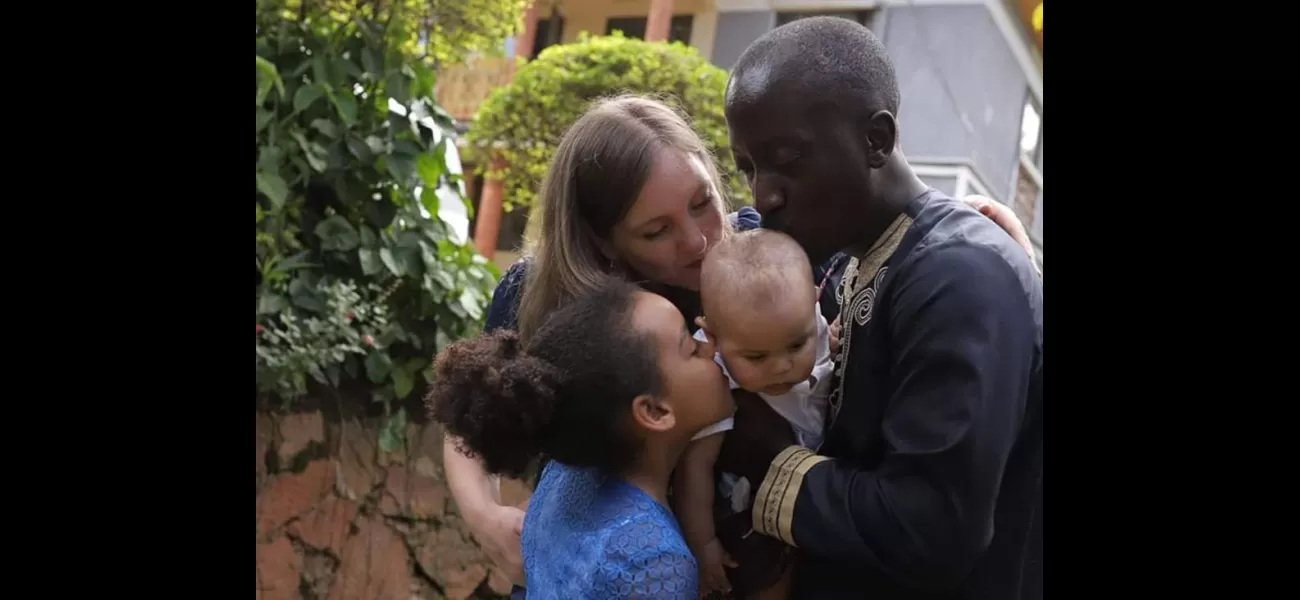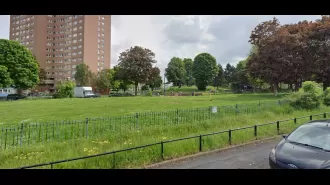My children don't know me until my wife makes £29,000.
The government seems to imply that wealthy individuals are the only ones allowed to have relationships with foreigners.
April 11th 2024.

David received a call on his mobile phone and answered it with a sudden rush of excitement. It was his wife, Rebecca, on a WhatsApp video call. She was in the dim light of the maternity ward, holding their newborn son in her arms. David was filled with joy and relief to see that both mother and baby were doing well, but he also felt a pang of sadness. Instead of being by her side, he was stuck four thousand miles away in Uganda.
It wasn't the first time David had missed the birth of one of his children. Unfortunately, due to an impossibly high minimum income requirement for a spouse visa, he was forced to live away from his wife and children. David and Rebecca had met in 2011, when she had come to Uganda from the UK as a volunteer to help improve child welfare. They had a connection from the start, but it wasn't until David drove her and some friends on a safari that they really got to know each other. They got engaged in 2013 and were married later that year in Uganda.
In 2014, they were overjoyed to discover that Rebecca was pregnant. Due to her specific medical needs, they decided to have the baby in the UK. However, this decision came with an additional hurdle for David. As a foreign national with a British wife, he had to apply for a visitor visa every time he wanted to visit his family in the UK. It was never a guaranteed approval, and just weeks before Rebecca's due date, his application was rejected. The case officer didn't believe he had sufficient ties to his home country that would compel him to return after his visit.
David was baffled by this decision. He had strong ties to Uganda, including family, a place of residence, and an active business. He had even returned to Uganda after a previous visit to the UK had ended. Thankfully, his second application was successful, but it was a close call. He arrived at the hospital just minutes after his daughter was born. Despite the difficult journey, holding his daughter for the first time was one of the happiest moments of his life.
For the next four years, David and his family lived together in Uganda. But in 2019, they made the difficult decision for Rebecca and their daughter to move to the UK. David would stay behind until they could meet the requirements for a spouse visa. The day they left was heart-wrenching for David. He tried to remain positive as he hugged his wife and daughter goodbye, but inside he was grieving.
Unfortunately, the process of applying for a spouse visa proved to be even more complicated and difficult than they had anticipated. Since 2012, UK citizens have been required to earn and maintain a minimum income of £18,600 per year in order to sponsor their loved ones to live with them in the country. This amount was even higher if they wanted to also sponsor dependent children. This was the first real insight for David and Rebecca into just how challenging it would be for them to settle as a family in the UK.
As I was surrounded by my family, my phone suddenly rang and I answered it with a jolt. To my surprise, it was my wife Rebecca calling me on a WhatsApp video call. She was at the dimly lit maternity ward, holding our newborn son in her arms. I couldn't contain my joy and relief to see both mother and baby doing well, but at the same time, I couldn't help but feel a tinge of sadness. Instead of being by her side, I was stuck four thousand miles away in Uganda.
This was the second time I missed the birth of one of my children, and it was all because of the strict minimum income requirement for a spouse visa. Due to this requirement, I am forced to live away from my wife and children. Rebecca and I first met in 2011 when she came to Uganda from the UK as a volunteer to help with child welfare. I was immediately drawn to her kind soul and spiritual nature, but we only got to know each other better when I drove her and her friends on a safari to Murchison Falls.
Our love grew stronger and we got engaged in June of 2013, with a not-so-romantic proposal. But that didn't stop her from saying yes, and in September that same year, we tied the knot in front of our loved ones and started our life together in Kampala, the capital of Uganda. In 2014, we were overjoyed to find out that Rebecca was pregnant. Due to her specific medical needs, we made the decision to have the baby in the UK.
Unfortunately, this decision came with an additional hurdle for me. As a foreign national, I must apply for a visitor visa every time I want to visit my wife and family in the UK. It's not a guaranteed approval, and just weeks before Rebecca's due date, my visa application was rejected. The case officer believed that I didn't have enough ties to my home country to ensure my return after my visit. This came as a shock to me, as I have extensive family ties, a place of residence, and an active business in Uganda, all of which would require me to come back. Not to mention, I had already returned home after a previous visit to the UK.
Thankfully, my second visa application was approved, but only after I showed proof that we had prepared our home in Uganda for the arrival of our baby. However, due to the delay in approval, I missed the birth of my daughter in 2015 by just a few minutes. I arrived at the hospital straight from the airport, and despite the difficult journey, holding my first-born child in my arms was one of the happiest moments of my life.
It's been a challenging journey for us as a family, with me living in Uganda and Rebecca and the children in the UK. It feels like we're a bereaved single-parent household, with my wife's presence only felt through phone calls. Three months after our daughter's birth, we all moved back to Uganda and lived together until 2019. However, considering our daughter's future education and Rebecca's job prospects, we made the difficult decision for them to move to the UK while I stayed in Uganda until we met the requirements for a spouse visa.
Saying goodbye to my wife and four-year-old daughter at the airport was heartbreaking. I tried to stay positive and cheerful on the outside, but inside, I was grieving. We hoped it wouldn't be long until we were reunited, but we were wrong. The process of applying for a spouse visa as a UK citizen is complicated and includes meeting a minimum income requirement of £18,600 per year. This amount is even higher if you want to sponsor dependent children. This was our first real insight into the challenges we would face in settling as a family in the UK.
It wasn't the first time David had missed the birth of one of his children. Unfortunately, due to an impossibly high minimum income requirement for a spouse visa, he was forced to live away from his wife and children. David and Rebecca had met in 2011, when she had come to Uganda from the UK as a volunteer to help improve child welfare. They had a connection from the start, but it wasn't until David drove her and some friends on a safari that they really got to know each other. They got engaged in 2013 and were married later that year in Uganda.
In 2014, they were overjoyed to discover that Rebecca was pregnant. Due to her specific medical needs, they decided to have the baby in the UK. However, this decision came with an additional hurdle for David. As a foreign national with a British wife, he had to apply for a visitor visa every time he wanted to visit his family in the UK. It was never a guaranteed approval, and just weeks before Rebecca's due date, his application was rejected. The case officer didn't believe he had sufficient ties to his home country that would compel him to return after his visit.
David was baffled by this decision. He had strong ties to Uganda, including family, a place of residence, and an active business. He had even returned to Uganda after a previous visit to the UK had ended. Thankfully, his second application was successful, but it was a close call. He arrived at the hospital just minutes after his daughter was born. Despite the difficult journey, holding his daughter for the first time was one of the happiest moments of his life.
For the next four years, David and his family lived together in Uganda. But in 2019, they made the difficult decision for Rebecca and their daughter to move to the UK. David would stay behind until they could meet the requirements for a spouse visa. The day they left was heart-wrenching for David. He tried to remain positive as he hugged his wife and daughter goodbye, but inside he was grieving.
Unfortunately, the process of applying for a spouse visa proved to be even more complicated and difficult than they had anticipated. Since 2012, UK citizens have been required to earn and maintain a minimum income of £18,600 per year in order to sponsor their loved ones to live with them in the country. This amount was even higher if they wanted to also sponsor dependent children. This was the first real insight for David and Rebecca into just how challenging it would be for them to settle as a family in the UK.
As I was surrounded by my family, my phone suddenly rang and I answered it with a jolt. To my surprise, it was my wife Rebecca calling me on a WhatsApp video call. She was at the dimly lit maternity ward, holding our newborn son in her arms. I couldn't contain my joy and relief to see both mother and baby doing well, but at the same time, I couldn't help but feel a tinge of sadness. Instead of being by her side, I was stuck four thousand miles away in Uganda.
This was the second time I missed the birth of one of my children, and it was all because of the strict minimum income requirement for a spouse visa. Due to this requirement, I am forced to live away from my wife and children. Rebecca and I first met in 2011 when she came to Uganda from the UK as a volunteer to help with child welfare. I was immediately drawn to her kind soul and spiritual nature, but we only got to know each other better when I drove her and her friends on a safari to Murchison Falls.
Our love grew stronger and we got engaged in June of 2013, with a not-so-romantic proposal. But that didn't stop her from saying yes, and in September that same year, we tied the knot in front of our loved ones and started our life together in Kampala, the capital of Uganda. In 2014, we were overjoyed to find out that Rebecca was pregnant. Due to her specific medical needs, we made the decision to have the baby in the UK.
Unfortunately, this decision came with an additional hurdle for me. As a foreign national, I must apply for a visitor visa every time I want to visit my wife and family in the UK. It's not a guaranteed approval, and just weeks before Rebecca's due date, my visa application was rejected. The case officer believed that I didn't have enough ties to my home country to ensure my return after my visit. This came as a shock to me, as I have extensive family ties, a place of residence, and an active business in Uganda, all of which would require me to come back. Not to mention, I had already returned home after a previous visit to the UK.
Thankfully, my second visa application was approved, but only after I showed proof that we had prepared our home in Uganda for the arrival of our baby. However, due to the delay in approval, I missed the birth of my daughter in 2015 by just a few minutes. I arrived at the hospital straight from the airport, and despite the difficult journey, holding my first-born child in my arms was one of the happiest moments of my life.
It's been a challenging journey for us as a family, with me living in Uganda and Rebecca and the children in the UK. It feels like we're a bereaved single-parent household, with my wife's presence only felt through phone calls. Three months after our daughter's birth, we all moved back to Uganda and lived together until 2019. However, considering our daughter's future education and Rebecca's job prospects, we made the difficult decision for them to move to the UK while I stayed in Uganda until we met the requirements for a spouse visa.
Saying goodbye to my wife and four-year-old daughter at the airport was heartbreaking. I tried to stay positive and cheerful on the outside, but inside, I was grieving. We hoped it wouldn't be long until we were reunited, but we were wrong. The process of applying for a spouse visa as a UK citizen is complicated and includes meeting a minimum income requirement of £18,600 per year. This amount is even higher if you want to sponsor dependent children. This was our first real insight into the challenges we would face in settling as a family in the UK.
[This article has been trending online recently and has been generated with AI. Your feed is customized.]
[Generative AI is experimental.]
0
0
Submit Comment





